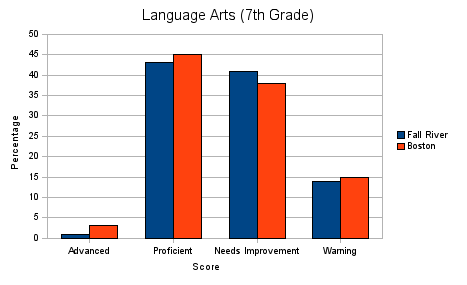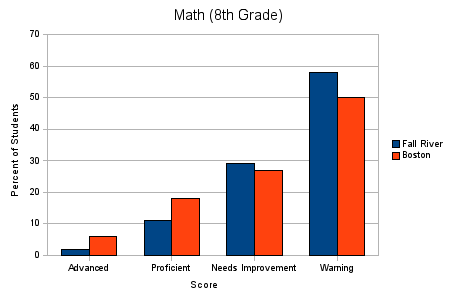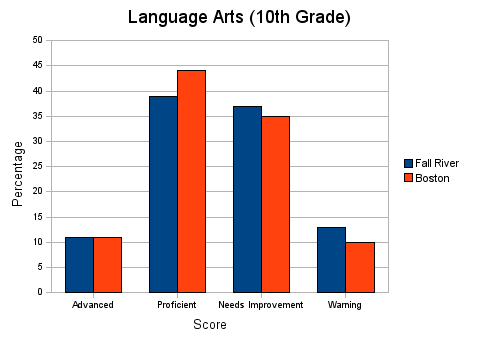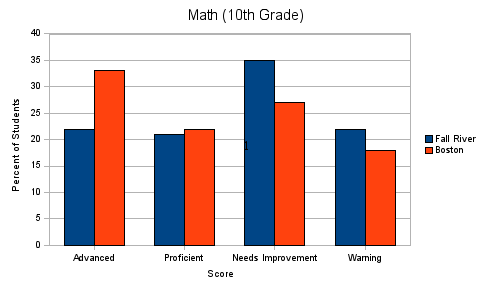A few minutes ago, I was reading an article from my hometown's newspaper, the Fall River Herald News. It was an article indicating that half of the schools in Fall River have been classified as "needs improvement" by the state. I'm not here to talk to you about the article so much; it was hardly good news, but nothing new for Fall River. Instead, I'd like to talk about the comments. You see, I was reading this article online, and the online edition of the Herald has a comments field. Here are two of the posted comments, reproduced for analysis' sake:
duclos
city gets what it pays for--- city gives the least amount of money to education in the state-and the money they do have they misuse
1972
Thanks duclos, I knew that was the problem with our schools. We have to start paying our teachers more in order to get them to teach! I figure $80,000 to $90,000 a year might get us off the failure list.
I think that this represents an interesting divide in the perception of schools, and one which I've seen a lot, at least anecdotally. So I thought I'd do some research.
First, I found out what teacher salaries actually are. I've reproduced them in the table below:
| Post | Starting Salary | Max Salary |
|---|---|---|
| Fall River - Teacher | $33,628 | $62,350 |
| Boston Public Schools - Teacher | $44,49 | $89,029 |
Okay, so compared to Boston, we pay our teachers pitifully. Not that Boston is great — the average starting salary of a graduate from my school is $59,165 [ref]. But what does Boston's extra money buy? To try and judge this, I looked at the MCAS scores from Fall River and Boston. MCAS is the "Massachusetts Comprehensive Assessment System" — it's our No Child Left Behind standardized test. It doesn't actually do a very good job of testing any skills, and has generally made schools in Fall River even worse than they used to be, which I didn't think was possible. A brief note about the following statistics: they "follow" a class, which is to say that the 7th-grade scores are from 2004, the 8th grade from 2005, and the 10th grade from 2007.

I'm only considering middle and high schools here, so the first category we're going to consider is 7th grade Language Arts. I've taken the time to graph our relative scores; you can see the chart at left. It looks pretty good - in fact, Fall River did only a little worse than Boston, with 44% "Proficient" and above versus Boston's 48%.

Now, for the libertarians amongst you, don't be getting too excited. At right you can see the same chart for the 8th-Grade Math MCAS exam. In this test, Fall River had an outstanding 13% achieve "Proficient" or above, compared to Boston's 24%. Maybe there is something to this idea of actually paying teachers reasonable salaries? Although, while we're talking about it, both of these numbers are abysmal. I've seen a fair bit of math here at Mudd (what else are the 8 math courses in Core for?), and CS is rather close to Math, so I like math. But, regardless of your opinions of it, more than 24% of the population should be "Proficient" at 8th-Grade math...

Well, let's move on an examine 10th grade. At right, you can see the language arts test. Fall River still trails Boston with 50% Proficient vs. Boston's 55%. Not a huge difference, and I'm far too lazy to test whether it's statistically significant, but we're certainly not coming out ahead here.

Finally, we come to 10th-grade math. Thankfully, the numbers are up a bit here, but you'll note that Fall River is still trailing Boston by quite a bit.
Okay, so now you've been inundated by numbers and graphs, what does it all mean? Well, if we average over all tests and all years considered, Fall River has a 37% rate of "Proficient" or better, and Boston has a 45% rate of "Proficient" or better. Of course, we shouldn't really be comparing these, as Boston is a large, fairly affluent city, and Fall River is a small, poor city.
In the end, the entire system disgusts me. Students spend literally years in classrooms being taught how to pass a test (MCAS). It's no wonder why there are so many discipline problems — this isn't material that anybody really cares about. And then, after those years and years, they take a high-pressure test every day for a week that will determine whether or not they can graduate, and a million other things. And, yet, despite the arbitrary and pointless nature of this test, the vast majority of students do not even score "Proficient" on it.
You'll also note that I've been listing Fall River as a "poorer" city than Boston here. Well, here's an interesting fact: of the students in the Fall River Public School System versus those in the Boston Public School System, 6% more of Boston's are listed as "low-income". So what's our excuse now?
Of course, I don't seek to lay blame solely on teachers — I've had plenty of excellent teachers. But clearly, something is wrong.
Want to comment on this? How about we talk on Mastodon instead? Share on Mastodon
Share on Mastodon